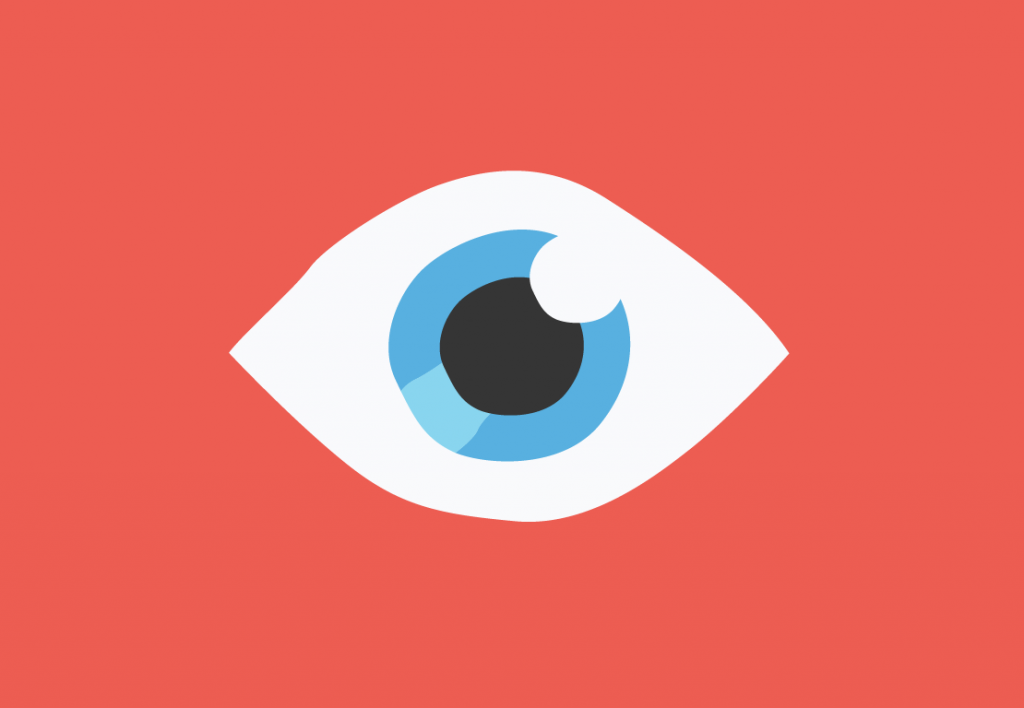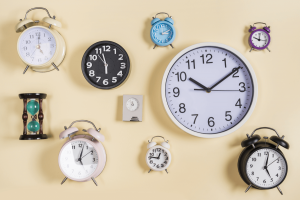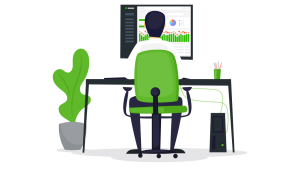How to deal with the “big brother” feeling in the office?

That moment when you realize that the working day is almost over and you still haven’t done anything… It’s frustrating, we agree. And so it’s no wonder that this can cause that scary “big brother” feeling to come up.
You know, the one that makes you think that your boss is watching you and that he is about to come to your desk any minute, ready to ask why you spent 45 minutes on non-productive apps today — Facebook and Youtube, specifically.
The fear of some kind of office surveillance is a valid one, as no one wants to feel as though they’re being watched constantly. It creates a feeling of mistrust. And why would anyone want to work for a company that doesn’t trust its employees? Therefore, it’s very important that the tools and methods of collecting data have features that respect the privacy of employees.
Want to get the most out of your time?
Try DeskTime for free!
Try free for 14 days · No credit card required.
By signing up, you agree to our terms and privacy policy.

However, if your company is using DeskTime, then you should know that it highlights only the extreme cases. So, only if you spend hours on non-productive apps regularly or come to work late every day will it be noticed.
Are you still feeling uncomfortable with time-tracking software on your computer? We summarized a few tips that will hopefully help you to deal with that anxious feeling.
Track your own time
Unless you are trying to do as little as possible and are hoping that it stays unnoticed, try to perceive time tracking software, such as DeskTime and others, as a tool that helps you improve your productivity rather than something your boss wants to use to spy on you. Because the main purpose of DeskTime is to help you understand where your time is going. So, take advantage of it!

Source: Freepik
You can even turn time tracking into a friendly competition where you and your colleagues split into teams and try to reach the highest level of productivity during the week or month. By the way, don’t be shy about adding some extra motivation in this game – the team that wins gets, for example, a pizza from the teams that lose the friendly challenge.
Another way to perceive time tracking is as a tool for extra motivation that can help you become a more productive employee. For example, the Pakistani-American company Hire Live Support promotes DeskTime to its employees as a tool that helps them to reach their goals and, in addition, allows them to earn some extra money. As their Operational Director Sam Davis explains:
“I highly recommend that you use time tracking not only for calculating payrolls, but also to implement new, productivity-promoting policies. Explain to your team that they won’t be losing money because a company implements a time tracking software [..]. Instead, show them that if they reach their goals, they can make extra dollars.”
So, to make time tracking beneficial both for you and your employer, make the suggestion that the most productive employee should get a cash bonus.
Use the software for self-discipline
You can think about time tracking software in your offices as a shopping mall security system – it provides order (motivates you to do your job) and keeps you safe (provides proof that you’ve been working). This means that it’s a necessary tool to ensure order and space for “betterment”.
But the truth is that some degree of surveillance in the office is necessary for productivity. An experiment by two Dutch designers showed that too much freedom and flexibility in the workplace can end up in a ‘’financial collapse’’. The experiment showed that given complete freedom, employees simply start to spend too much time entertaining themselves rather than work.

Source: Unsplash
In addition, Accenture conducted a research where they found that seven in ten business leaders expected that after the collected data analysis they could improve the productivity of their employees.
But what about the employee point of view? Agnese is an employee in the company Setupad where they use DeskTime as their time tracking software of choice. She tells:
“I don’t feel like we’re being constantly watched by our bosses, but it [time tracking software] definitely helps to focus on the job, knowing that any website you visit is read as productive or not.”
What can we conclude from this? That time tracking not only boosts productivity but also improves time management skills while helping you to focus.
Put simply, as much as we don’t like to be monitored, monitoring can actually help us. And self-monitoring with the help of DeskTime is a better way to view it than to view it as a feeling that your boss is micromanaging you and your colleagues.

Want to keep your team happy?
Time tracking is a great tool to avoid employee burnout.
Create your own zone of privacy
The paradox, however, lies in the fact that while broad visibility can indeed foster productivity, leaving the employees without any privacy can do a significant amount of damage to performance.
Ethan S. Bernstein in his study argues that when given the right degree of privacy, employees are more willing to cooperate, e.g., by sharing tips during the breaks or helping each other out. As a result of having this privacy, employees’ productivity may increase by 10 to 15 percent.
Thus, find your zone of privacy – step away from your computer, use a pen and paper to write down and organize ideas, rest for a few minutes in the comfort of your own privacy, and then go back to work refreshed.

Source: Unsplash
And if you have DeskTime, use the “private time” setting to surf the Internet just for your own needs. At any point, you can turn on Private Time, and all of your time spent won’t be tracked. The best part? You can set your “Private Time” reminder to remind you to turn it back off – because when you do return to work, DeskTime makes sure you get full credit for it!
Don’t feel bad about taking breaks
Did you know that having regular breaks can reduce stress, improve your engagement with a task, and in general make work more enjoyable?
Our research showed that regular breaking is the habit of the most productive employees. The main idea is that taking a rest for 17 minutes, every 52 minutes, will help you become more productive. In other words, breaks should be encouraged. So, don’t feel bad about taking a rest, as both you and the company will benefit from that.

Source: Unsplash
DeskTime has a built-in Pomodoro timer feature that will automatically remind you to take a break, so you can get back to work rested, energized, and extra determined to reach your day’s goals.
At the end of the day, how much you’ve done will count instead of how much time you spent on doing it. Most likely, your boss will agree with that.
In conclusion
It’s understandable that from an employee’s point of view time tracking can be perceived as a tool for micromanagement. However, you have to keep in mind all the benefits that it confers to you, like self-awareness of how you’re doing your job or how much of a productivity boost you’re getting.
With or without time-tracking software, you will probably be monitored at the workplace. That’s what managers are supposed to do. The difference is that you can actually use apps like DeskTime for your own benefit, not theirs. So, why not give it a try?
Did you find this article useful? Give it a clap!
Psst! You can clap more than once if you really loved it 🙂